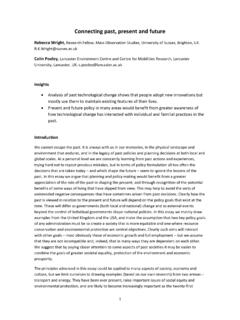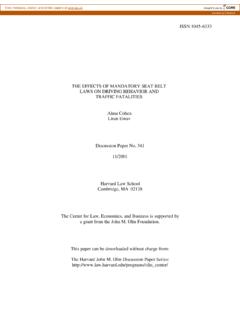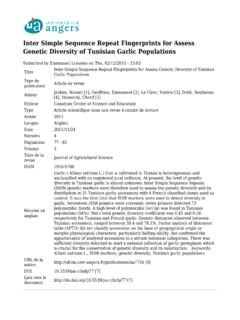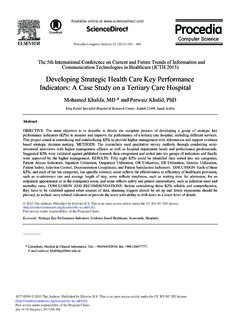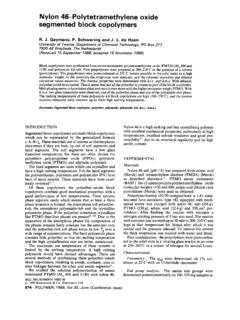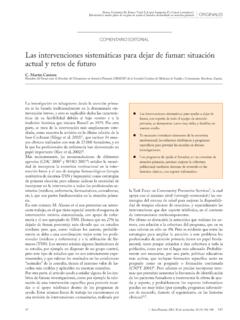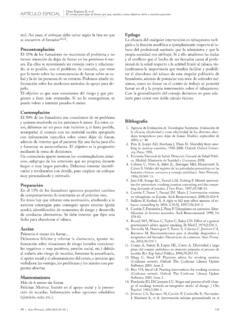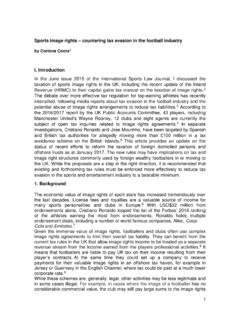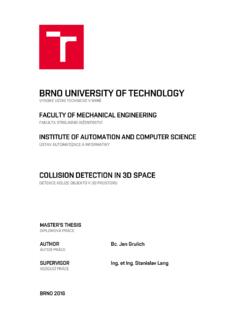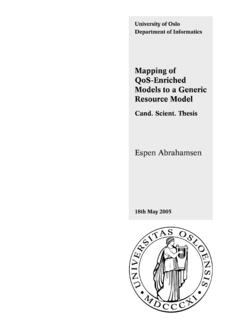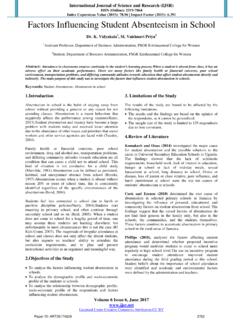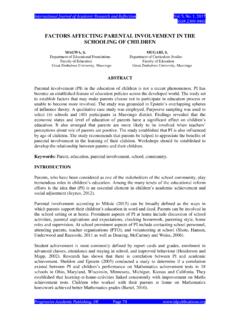Transcription of The Effects of Sleep on Academic Performance and Job ...
1 Apparel, Events and Hospitality ManagementPublicationsApparel, Events and Hospitality ManagementSpring 2014 The Effects of Sleep on Academic Performance andJob PerformanceYu-Chih ChiangIowa State UniversitySusan W. ArendtIowa State University, ZhengIowa State University, A. HanischIowa State University, this and additional works at: of theCognition and Perception Commons,Experimental Analysis of Behavior Commons,Human Factors Psychology Commons, and theWork, Economy and Organizations CommonsThe complete bibliographic information for this item can be found For information on how to cite this item, please Article is brought to you for free and open access by the Apparel, Events and Hospitality Management at Iowa State University Digital has been accepted for inclusion in Apparel, Events and Hospitality Management Publications by an authorized administrator of Iowa State UniversityDigital Repository.
2 For more information, please to you by COREView metadata, citation and similar papers at by Digital Repository @ Iowa State UniversityThe Effects of Sleep on Academic Performance and Job PerformanceAbstractThe purpose of this study was to explore the Effects of Sleep on Academic Performance and job Performance . Atotal of 172 undergraduate students completed an on-line questionnaire and their GPAs were obtained fromthe registrar's office. Data were analyzed using t-test, principal component analysis, and step wise results were consistent with delayed Sleep phrase syndrome, a common Sleep problem in college , Sleep latency and Sleep medicine were negatively correlated with Academic Performance , and sleepquality was significantly associated with job Performance . The knowledge of the impact of Sleep is effective foreducators and employers in helping students with Sleep problems.
3 Educators and employers need to becognizant of the importance of Sleep for students' success in their Academic Performance and and Perception | Experimental Analysis of Behavior | Human Factors Psychology | Work,Economy and OrganizationsCommentsThis article is published as Chiang, , Arendt, S., Zheng, T., and Hanisch, K. The Effects of Sleep onacademic Performance and job Student Journal48 (1), 72-87. Posted with article is available at Iowa State University Digital Repository: Effects OF Sleep ON Academic Performance AND JOB PERFORMANCEYu-cHiH cHiang susan W. arendt tiansHu zHengkatHY a. HaniscH Iowa State UniversityThe purpose of this study was to explore the Effects of Sleep on Academic Performance and job Performance . A total of 172 undergraduate students completed an on-line questionnaire and their GPAs were obtained from the registrar s office.
4 Data were analyzed using t-test, principal compo-nent analysis, and stepwise regression. The results were consistent with delayed Sleep phrase syndrome, a common Sleep problem in college students. Also, Sleep latency and Sleep medicine were negatively cor-related with Academic Performance , and Sleep quality was significantly associated with job Performance . The knowledge of the impact of Sleep is effective for educators and employers in helping students with Sleep problems. Educators and employers need to be cognizant of the impor-tance of Sleep for students success in their Academic Performance and job is very important to a human being s health. Sleep loss not only makes people feel sleepy in the daytime, it is even a possible factor for Alzheimer s disease (Slats, Claas-sen, Verbeek, & Overeem, 2013).
5 The Effects of Sleep manifest in both health and perfor-mance. The relationships between Sleep and Performance have been studied in many dif-ferent fields including human science, med-icine, psychology, education, and business. Sleep -related variables ( Sleep deficiency, Sleep quality, Sleep habits) have been shown to influence Performance of students and workers (Lack, 1986; Mulgrew et al., 2007; National Sleep Foundation, 2008; Pilcher & Huffcutt, 1996; Rosekind et al., 2010). There-fore, the purpose of this study was to deter-mine the effect of Sleep on Academic and job and HealthThe history of Sleep research can be traced back to the 19th century (Pelayo & Guilleminault, 2009). According to the Na-tional Sleep Foundation s Sleep in America Poll, adults Sleep about seven hours every night, a decrease of approximately two hours per night since the 19th century (National Sleep Foundation, 2005).
6 In 2008, the same organization found that Americans expected to average 7 hr 18 min of Sleep per night, but they actually only slept an average of 6 hr 40 min (National Sleep Foundation, 2008). A common term for loss of Sleep is Sleep deprivation. Drummond and McK-enna (2009) stated that Sleep deprivation in humans can be broadly classified into three categories: total Sleep deprivation, partial Sleep deprivation, and Sleep fragmentation (p. 249). In previous studies, Sleep deprivation was measured by type: long-term total Sleep deprivation (continually awake for more than 45 hours), short-term total Sleep deprivation (continually awake for up to 45 hours), and partial Sleep deprivation (sleeping less than 5 hours in a 24-hour period) (Pilcher & Huff-cutt, 1996).
7 The Effects of Sleep on Academic Performance and Job Performance / 73 Rosen et al. (2006) investigated the asso-ciation between Sleep deprivation and mood disturbance, empathy, and burnout among 47 (80% response rate) interns in a medical residency program. The researchers found an increased prevalence of chronic Sleep deprivation (9% to 43%), sleepiness (11% to 36%), moderate depression ( to ), and burnout ( to ) by the end of the internships. Simpson and Dinges (2007) reviewed a number of comprehensive studies that examined the Effects of Sleep loss on the human immune system. They found that the levels of important immune-related chemical substances in blood plasma were different at bedtime and wake-up time. These irregular changes in the immune system affected both behavioral functions ( , sleepiness, fatigue, and attention lapses) and physiological func-tions ( , inflammation).
8 Lack of Sleep has been linked to emotional and physical health Effects including depression, burnout, obesity, diabetes mellitus, hypertension, cardiovascu-lar disease, stroke, and even death (Rosen, Gimotty, Shea, & Bellini, 2006; Simpson & Dinges, 2007). Sleep and WorkShift work, also defined as working non-standard hours, has been shown to im-pact Sleep and circadian rhythms (Wyatt, 2001). This type of work schedule is common in the hospitality industry (Cleveland et al., 2007). Depending on occupation, studies found a stronger relationship between Sleep -iness and work limitations for white-collar workers ( , hospitality industry workers) as compared to blue-collar workers ( , in the manufacturing industry) (Mulgrew et al., 2007). A Study has also found that employees who did not get enough Sleep and experienced sleepiness during work hours had the highest percentage of accidents in the workplace and often nodded off during driving indicating work safety issues (Rosekind et al.)
9 , 2010). In the student population, Trockel, Barnes, and Egget (2000) found that students who worked more hours had lower GPAs than students working fewer hours. As of yet, no known studies have been conducted to examine the relationships between Sleep , work hours, and workplace accidents in the hospitality man-agement and CollegeWeitzman et al. (1981) defined Delayed Sleep Phase Syndrome (DSPS) as follows: 1) long Sleep latency on weekdays (usually fall Sleep between 2 to 6 ); 2) normal Sleep length on weekends (usually Sleep late and wake up late on weekends); and 3) dif-ficulty staying asleep. This Sleep problem is common and is present in students around the world. In the , of undergraduate students were found to have DSPS (Brown, Soper, & Buboltz, 2001).
10 Australian studies found the prevalence of DSPS in students (17%) to be higher than in adults (6-7%) (Lack, 1986; Lack, Miller, & Turner, 1988). Studies related to DSPS have also been con-ducted in Japan, Norway, and Taiwan (Haza-ma, Inoue, Kojima, Ueta, & Nakagome, 2008; Schrader, Bovim, & Sand, 1993; Yang, Wu, Hsieh, Liu, & Lu, 2003). In Lack s (1986) study, the DSPS group experienced sleepiness on weekdays more often than the non-DSPS group. In addition, when course grades were examined, it was found that members of the DSPS group per-formed at a lower level academically when compared with the non-DSPS group. In a more recent study, Trockel et al. (2000) found that first-year college students with lower GPAs reported later bedtimes on weekdays and weekends and later wake-up times on weekdays and and Academic PerformanceThe relationship between Sleep and ac-ademic Performance was reviewed in a pre-vious study.
